
Youth Community

Aid Ukraine

Order Why Israel Resources

Support our ministry

Subscribe newsletter

Israel & Christians Today

Biblical understanding about Israel
Holocaust in Ukraine still very much alive
We are in Chernovtsy, a Ukrainian city close to the Moldavian border. A city where before the Second World War around 50,000 Jews used to live, half of the population. They had a vibrant Jewish life. Today, there are only 1,300 Jews left. Most of the others were killed during the Holocaust.
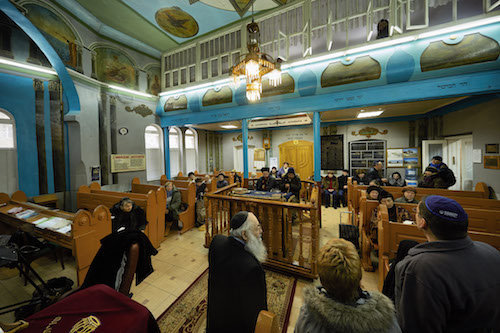
Handing out food parcels in Chernovtsy
The horrors of the Holocaust in Ukraine cannot be described in words. The story goes that the screaming and yelling of the Jews that were murdered and abused in Chernovtsy chilled the inhabitants to the bone, so that out of desperation they started ringing the church bells, to overrule the death screams.
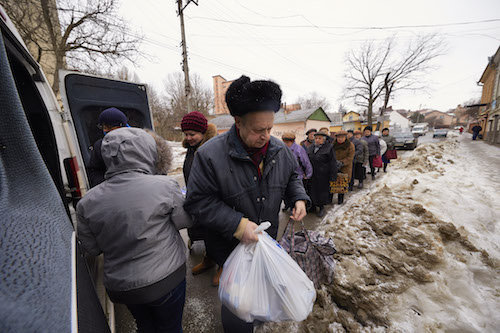
People from the Jewish community in Chernovtsy receive a food parcel from Christians for Israel | Photo credit: Jaco Klamer
From the seventy synagogues that were there before the war, today only one is still in use. The loss of Jewish life is painfully visible. We have a meeting in the Jewish community centre, where some Holocaust survivors come together weekly. To talk, to keep each other company, to break the loneliness of their existence.
Life in Ukraine is not easy, especially not for the elderly. In 2016, the price of energy increased by 100%. A large part of the pension of Holocaust survivors is spent on rent, gas and electricity. What remains is about 25 US $ a month to buy food – absolutely insufficient to survive.
Because of the extreme cold and the harsh circumstances, Christians for Israel has decided to distribute extra food parcels to the Jewish communities of Ukraine. In February and March 2017, they hope to distribute 5,000 food parcels, with your help.
Isaak Klimer (83): “When I think about the war, the first word that comes to mind is: horror. When I hear on the news today about refugees from the conflict area in East Ukraine, or about refugees from Syria, I identify strongly with them. As a child I was also a refugee.”
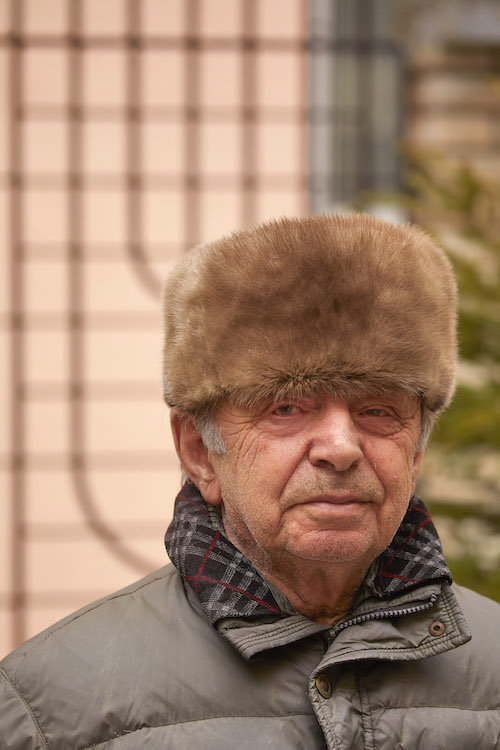
Isaak Klimer | Photo credit: Jaco Klamer
Isaak grew up in a small village in what is now called Moldova. A village where twelve Jewish families lived at the time. After living in a ghetto for a few weeks, his family was deported to the death camp Pechora. Two aunts of Isaak were killed there. His parents miraculously were able to escape the camp, together with Isaak and his brother. At that time, he was eight years old.
“I have horrible memories of the war. The human brain works in a strange way: I could forget easily what I have eaten yesterday, but my memories of the war are still crystal clear to me, even though I was still a child. I will carry them with me the rest of my life.”
Tanja Chuyalku (79) looks at us curiously when we enter her small home. It is cold, 12 degrees below zero. One of the coldest winters in years. It’s barely warmer Inside the house. A primitive wood-burning stove gives a little bit of warmth.
“Since last summer I haven’t had any visitors”, Tanja tells us. “You are the first ones, and the food I receive from you is so much, so incredibly much. I never drink coffee, because I cannot afford it. And pineapple, I have read about it, but I have never tasted it. And sunflower oil, that is so expensive, and you just give it to me! God bless you for your love.”
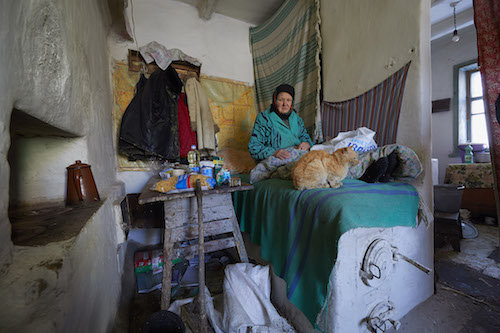
Tanja, a Jewish woman in Ukraine | Photo credit: Jaco Klamer
The only living soul she had seen in the past months is a neighbour that brings food every now and then. Tanja looks studiously at every article from the food parcel, with tears in her eyes. And then she starts talking. During the Second World War her whole family was murdered. She was three years old when the Nazis came to her village. “I remember how they shot people, how they came to our home with their guns. The Nazis didn’t understand I was a Jewish girl, with my blue eyes and blond hair. That is the only reason I survived. My sister Rosa looked Jewish, with dark hair and brown eyes. She was murdered.”
Burned alive
Tanja often thinks back about the Holocaust. “It was so terrible. My mother was holding me, I remember that. She pushed a pillow on my face, to stop me from screaming. I thought I was dying. My dear mother, with her beautiful curly hair. And my dear sister Rosa, I still cry about Rosa. The Nazis took her, just like that. Rosa, Rosa.”
It seems like Tanja can’t stop talking. When we want to leave, she says she has to tell us more. “At a certain stage the rumour was that the Nazis were cooking Jews in ovens. In the end, the rumour turned out to be true: children were burned alive. I remembered that we ran away. We fled into the forest, otherwise we would have had the same fate. My little sister, my dear Rosa.”
It is hard to say goodbye. A hug, a kiss, and Tanja is alone again. Alone with her stories, her pain, her grief. Alone in a remote village in Ukraine. Alone, with only a dark past, and no future.
![]()
Story: Sara van Oordt-Jonckheere
Pictures: Jaco Klamer
This article was published originally in the Dutch newspaper "Reformatorisch Dagblad" | Photo credit: Jaco Klamer.
Friendship
Food parcels are regularly distributed among Holocaust survivors, poor families, Jewish refugees, children and the sick. A food parcel is more than a bag of food. It’s a sign of your friendship and your support, a testimony to our Jewish brothers and sisters that they are not alone.
Will you help?
The cost of one food parcel is 10 euros or 11 US $. For this amount we buy wholesale products. The parcels are packed by volunteers and distributed throughout Ukraine. Will you help with one or more food parcels? Your support is desperately needed!
| Donate in € | Donate in US $ |
1 food parcel costs 10 euros / 11 US $ and consists of:
1 kg of sugar
1 kg of rice
1 kg of grits
2 kg of pasta
1 liter of oil
1 kg of flour
500 gr of oatmeal
1 box of tea
250 ml of condensed milk
1 can of fish
1 box of cookies
1 bar of chocolate
200 gr of coffee
1 can of peas
1 can of corn
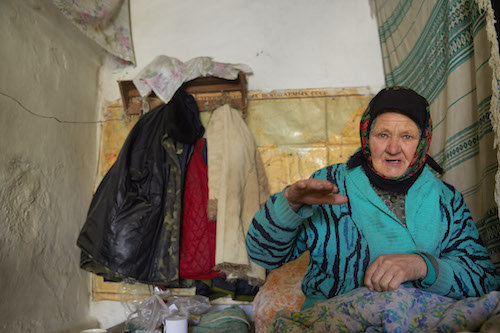
Tanja, a Jewish woman in Ukraine | Photo credit: Jaco Klamer
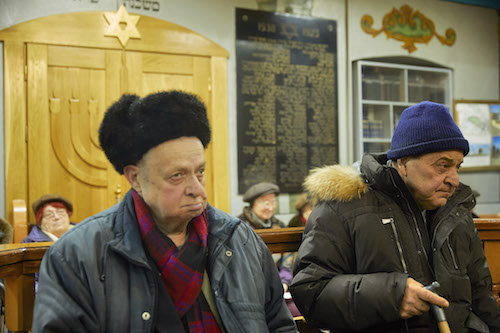
In the synagogue of Chernovtsy



